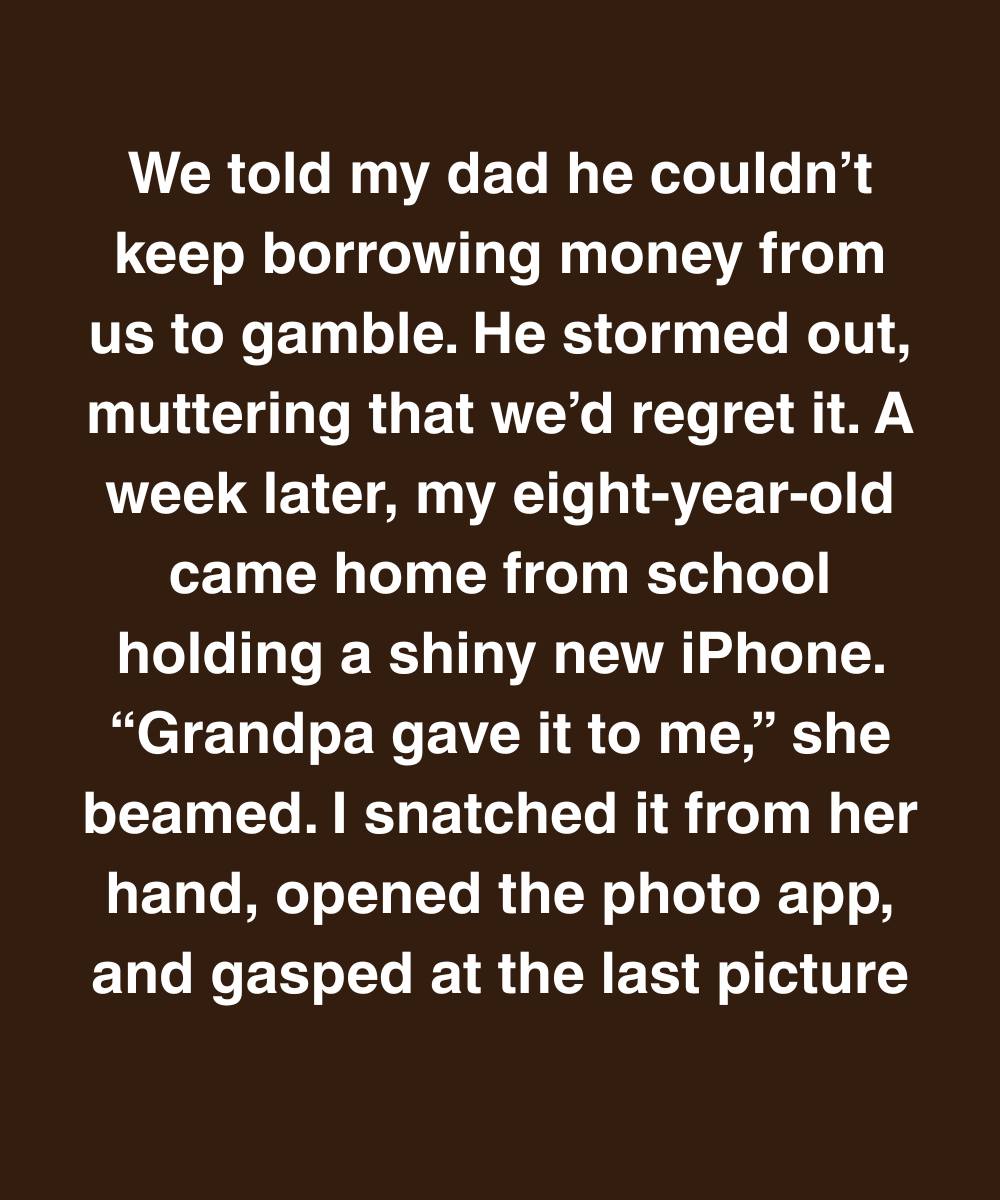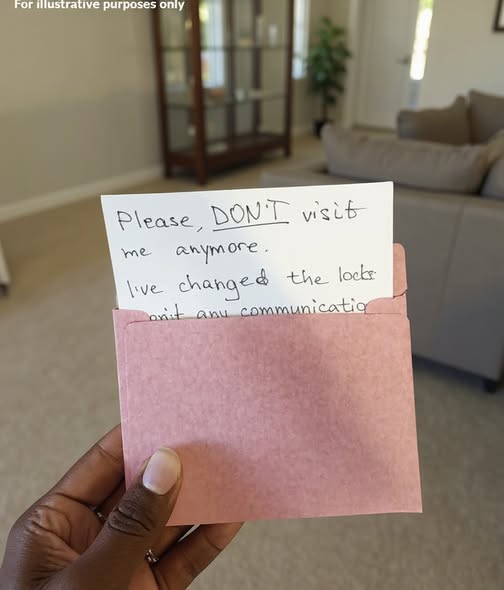
We told my dad he couldn’t keep borrowing money from us to gamble. He stormed out, muttering that we’d regret it. A week later, my eight-year-old came home from school holding a shiny new iPhone. “Grandpa gave it to me,” she beamed. I snatched it from her hand, opened the photo app, and gasped at the last picture.
It was a picture of my daughter, asleep, clearly taken from outside her bedroom window.
I couldn’t breathe. My heart pounded in my ears. The photo was time-stamped at 2:17 a.m.—three nights ago. The porch light was off that night. I remembered because the bulb had burned out and my husband hadn’t replaced it yet.
I looked at my daughter, who was humming and twirling her backpack, totally unaware. I hugged her a little too tight. “Sweetie, did Grandpa say anything else?”
She shrugged. “He just said he misses me and that I can call him anytime. But I can’t tell you or Daddy, or you’ll take the phone.”
That was it. I called my husband, Nate, at work and told him everything. He came home immediately.
“He’s crossed a line,” Nate said. “I don’t care if he’s your dad. This is not normal.”
We sat down with our daughter and gently explained why she couldn’t keep the phone. She pouted but didn’t argue when I handed her my old tablet as a peace offering.
Then I blocked Dad’s number on every device she had access to.
That night, I scrolled through the iPhone some more. Most of the gallery was empty, but I found a deleted folder with more photos—blurry shots of our backyard, our mailbox, even our garage door slightly ajar. It was like he’d been watching us.
The next morning, I drove to the address where he’d been staying—a run-down apartment he’d found after losing the family house to poker debt. When he opened the door, his eyes were glassy, and I could smell the whiskey before he even spoke.
“You’ve got some nerve,” I snapped, waving the phone in his face. “What is this?”
He barely glanced at it. “I gave her a gift. I’m her grandfather. Not a crime.”
“You told her to hide it from us. You were outside our house in the middle of the night, taking pictures of her window. That is a crime.”
He scratched his cheek, not meeting my eyes. “I just… I miss her. I’m not dangerous.”
“No, just reckless and completely out of line,” I said. “You need help, Dad.”
That’s when he exploded. “You think you’re so perfect! Sitting on your high horse with your husband and your matching patio furniture. I lost everything, and you all just watched it happen!”
I didn’t yell back. I was too tired. I left the phone on his chipped coffee table and walked out.
That night, I lay in bed, unable to sleep. My mind kept replaying that photo of my daughter. Not just the fact that he took it, but how—how he stood there, quietly, in the dark, taking a picture of his sleeping granddaughter like it was a sweet moment. It chilled me.
But something else was bothering me too. The phone was brand new. A $1,000 phone. My dad couldn’t afford groceries last month.
So where’d he get the money?
The next morning, I started digging. I checked with my sister, Dana. She hadn’t spoken to Dad in months.
“No, I haven’t given him anything,” she said. “I blocked him after he asked me to cash a check he wrote to himself on a closed account. Why?”
When I told her about the iPhone, she cursed under her breath.
“You think he stole it?” I asked.
She paused. “Or pawned something. Remember Grandma’s watch?”
My stomach dropped.
Years ago, before dementia took over, Grandma had passed down her gold watch to me. I’d kept it in a little box in my closet, thinking maybe I’d give it to my daughter when she was older.
I sprinted upstairs and tore through my closet.
It was gone.
I hadn’t even noticed it missing.
That was the tipping point. We filed a police report. Not because I wanted Dad in jail, but because I had to draw the line somewhere. Breaking into our home, taking valuables, gifting stolen electronics to a child—this wasn’t just addiction. This was a full-blown descent into chaos.
When the officer came by, he listened carefully and nodded, like he’d heard similar stories a hundred times. He promised they’d investigate but reminded me that unless I had proof of the theft, not much could be done unless Dad confessed.
I showed him the pictures. He sighed. “This might help. We’ll follow up.”
It was heartbreaking.
I didn’t want to be the daughter who called the cops on her own father. But I also didn’t want to be the mother who ignored warning signs and paid for it too late.
Weeks passed. No updates. I blocked Dad’s number and tried to move on.
Then one Friday evening, a package arrived at our doorstep with no return label. Inside was my grandma’s watch—and a note, written in Dad’s shaky handwriting.
“I’m sorry. I needed money. I thought I could win it back. Please take care of her. She’s the only good thing I’ve ever done.”
There was no signature. Nothing else.
I called Dana. “Did you get anything?”
“No. Just you?”
I felt sick again. Where was he?
A few days later, I got a call from the hospital. Dad had been found unconscious behind a liquor store. Dehydrated. Malnourished. But alive.
When I got to his room, he looked like a shell of the man I grew up with. His eyes fluttered open when he heard my voice.
“I brought the watch back,” he whispered.
“I know,” I said, sitting beside him. “Thank you.”
He looked at me, tears welling up. “I didn’t mean to scare her. Or you. I just… I miss being someone who mattered.”
That hit me.
Because, for all his faults—and there were many—this man had once driven across town in the rain just to bring me a charger for my college laptop. He’d held my hand through childbirth. He’d taught my daughter how to balance on her scooter before the gambling took over everything.
I knew he needed help, not more shame.
So we got him into a recovery program.
It wasn’t smooth. He relapsed twice. He cursed at the staff. He missed appointments.
But each time, he came back.
Little by little, he improved.
One day, six months in, he sent me a message: “Would it be okay if I came to one of her soccer games? I’ll stay in the back. I just want to watch.”
I talked it over with Nate. We both agreed—with boundaries, yes.
He came. Quiet, sober, clean-shaven. He didn’t try to approach her. He just watched. Cheered softly when she scored.
She saw him. Ran to him afterward and gave him the tightest hug.
From then on, it was small steps. Supervised visits. Weekend breakfasts. Therapy sessions where he apologized, openly, to both of us.
He sold his car to repay what he could. Started volunteering at the same recovery center that helped him.
He’s not perfect. He probably never will be.
But he’s present.
My daughter still has the iPhone. We let her keep it—after we wiped it and set strict parental controls.
Now, every once in a while, she’ll FaceTime Grandpa to show him a drawing, or a new dance move.
Sometimes I watch their conversations from the doorway, quiet and a little amazed.
Not long ago, I was ready to erase this man from our lives.
But people don’t get better when you cut them off.
They get better when someone believes they can.
The biggest lesson I learned? Boundaries are not the same as abandonment. You can love someone and still say, “This is not okay.” You can protect your family and still offer a hand to someone who’s fallen.
Sometimes, the most powerful act of love is a second chance—with guardrails.
If you’ve ever had to choose between protecting your peace and keeping someone in your life, you’re not alone.
And sometimes, with time, honesty, and a lot of hard conversations, the right balance can be found.
If this story moved you, share it. You never know who might be standing at that same crossroads today.




